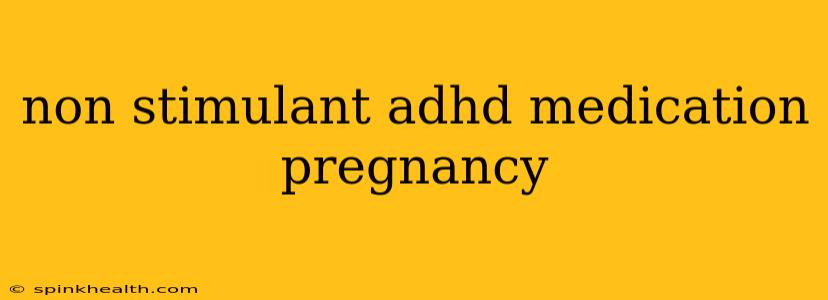The journey to motherhood is filled with joy, anticipation, and, often, a multitude of decisions. For women with ADHD who rely on medication to manage their symptoms, pregnancy presents a unique set of challenges. The question of continuing or discontinuing ADHD medication during pregnancy is a deeply personal one, requiring careful consideration of both maternal and fetal well-being. This article aims to shed light on the complexities surrounding non-stimulant ADHD medications and pregnancy, offering a balanced perspective informed by current research and medical best practices. Remember, this information is for educational purposes only and does not substitute professional medical advice. Always consult with your doctor or psychiatrist before making any changes to your medication regimen.
What are Non-Stimulant ADHD Medications?
Unlike stimulant medications like methylphenidate (Ritalin) and amphetamine (Adderall), non-stimulant ADHD medications work through different mechanisms in the brain. They don't directly affect dopamine and norepinephrine levels in the same way stimulants do. Common non-stimulant options include atomoxetine (Strattera) and guanfacine (Intuniv) and clonidine (Kapvay). These medications can help improve focus, attention, and impulse control, but their effects can be more subtle and may take longer to become apparent than with stimulants.
Is it Safe to Take Non-Stimulant ADHD Medication During Pregnancy?
This is a crucial question with no simple yes or no answer. Research on the effects of non-stimulant ADHD medications during pregnancy is ongoing and limited compared to stimulant medications. While generally considered to have a lower risk profile than stimulants, potential risks still exist. The decision of whether or not to continue medication during pregnancy must be made on a case-by-case basis, considering the individual's specific circumstances, the severity of their ADHD symptoms, and the potential risks and benefits of both medication and non-medication management.
What are the Potential Risks of Taking Non-Stimulant ADHD Medication During Pregnancy?
Although the risks associated with non-stimulant ADHD medications during pregnancy are considered lower than those associated with stimulants, potential risks still exist. These can include:
- Birth defects: While studies have not definitively linked non-stimulant medications to major birth defects, further research is needed to fully assess this risk.
- Preterm birth: Some studies have suggested a potential link between certain non-stimulant ADHD medications and preterm birth, but the evidence remains inconclusive.
- Low birth weight: Similar to preterm birth, the association between non-stimulant ADHD medication and low birth weight is not fully established and needs more research.
What are the Potential Risks of NOT Taking ADHD Medication During Pregnancy?
Uncontrolled ADHD symptoms during pregnancy can also pose risks, including:
- Increased stress and anxiety: Managing ADHD symptoms can be challenging, and untreated ADHD can exacerbate stress and anxiety during pregnancy.
- Difficulty with self-care: Untreated ADHD may make it harder to maintain healthy habits during pregnancy, such as maintaining a balanced diet, getting enough sleep, and managing prenatal care appointments.
- Impact on fetal development: While the direct impact is not definitively established, chronic maternal stress and poor self-care can indirectly affect fetal development.
What are the Alternatives to Medication During Pregnancy?
For some women, managing ADHD symptoms without medication during pregnancy might be an option. These alternatives may include:
- Therapy: Cognitive behavioral therapy (CBT) and other therapeutic approaches can provide valuable coping mechanisms for managing ADHD symptoms.
- Lifestyle changes: A healthy diet, regular exercise, sufficient sleep, and stress-reduction techniques can significantly impact ADHD symptoms.
- Supportive network: A strong support system from family, friends, or support groups can provide crucial emotional and practical assistance during pregnancy.
How Should I Discuss Medication During Pregnancy with My Doctor?
Open and honest communication with your healthcare provider is paramount. Discuss your concerns, your ADHD symptoms, and the potential risks and benefits of continuing or discontinuing your medication. Together, you can develop a personalized management plan that prioritizes the health and well-being of both you and your baby. Remember to involve your psychiatrist or other mental health professional in this conversation.
What Happens After Pregnancy?
After delivery, you and your doctor can reassess your medication needs. Postpartum is a period of significant adjustment, and your ADHD symptoms might change. Your healthcare team can help you navigate this transition safely and effectively, ensuring that you receive the appropriate care and support.
Remember, this information is for educational purposes only. Always consult with your healthcare provider for personalized guidance and treatment options. Navigating ADHD medication during pregnancy requires a collaborative approach, empowering you to make informed decisions throughout this special time in your life.

